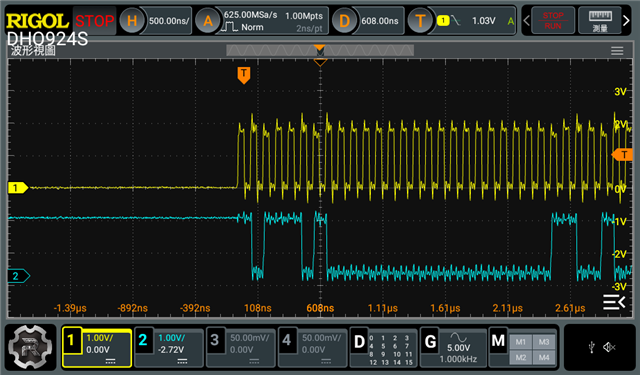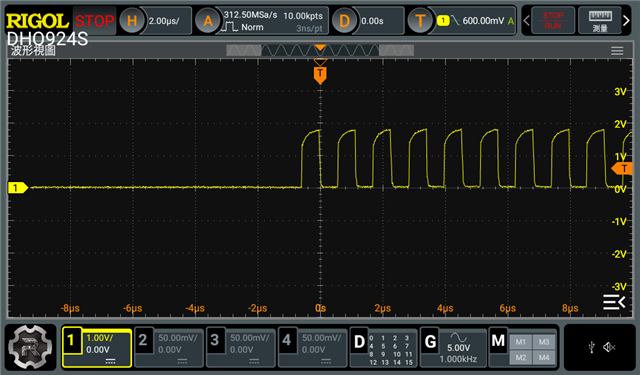Tool/software:
Dear TI Support,
We are currently working to integrate the CC33xx SDIO Wi-Fi module running Linux kernel v6.1.102. The driver was successfully compiled and loaded, but the Wi-Fi module fails to initialize properly.
-
Hardware was detected via SDIO:
[root@Augentix:/root]# ls -l /sys/bus/mmc/deviceslrwxrwxrwx 1 root root 0 Jan 1 00:03 mmc1:0001 -> ../../../devices/platform/soc@80000000/818c0000.sdc1_p0/mmc_host/mmc1/mmc1:0001
-
Both kernel modules were loaded:
[root@Augentix:/root]# lsmod
Module Size Used by Not tainted
cc33xx_sdio 3889 0
cc33xx 90836 1
-
However, during initialization, we encountered the following errors:
mmc1: new SDIO card at address 0001
random: crng init done
overlayfs: upper fs does not support tmpfile.
overlayfs: upper fs does not support RENAME_WHITEOUT.
overlayfs: failed to set xattr on upper
overlayfs: upper fs does not support tmpfile.
overlayfs: upper fs does not support RENAME_WHITEOUT.
overlayfs: failed to set xattr on upper
cc33xx_sdio mmc1:0001:2: Using SDIO in-band IRQ
wlcore: cc33xx_probe :: Start
wlcore: Wireless Driver Version 1.7.0.208
wlcore: WLAN CC33xx platform device probe done
wlcore: Chip wakeup
wlcore: Set BLKsize to 128
cc33xx_sdio mmc1:0001:2: sdio read failed (-84)
wlcore: ERROR IO error during core status read
wlcore: ERROR Fatal error during driver init, cannot recover
[root@Augentix:/root]#
=== AUGENTIX SPL v0.0.10 ===
DDR = Generic DDR3, 1600 MT/s, DDR3, 128 MB
DRAM INIT PASS, ret: 0x00000640
[PLL INFO]
CPU Fvco 1008000000
port3(N/A ): -1
port4(N/A ): -1
port5(N/A ): -1
DRAM Fvco 1596000000
port3(N/A ): -1
port4(AXI DRAMC): 399000000
port5(N/A ): -1
Cascade Fvco 1350000000
port3(N/A ): -1
port4(25M ): 25000000
port5(27M ): 27000000
EMAC Fvco 1500000000
port3(EMAC ): 250000000
port4(QSPI ): 150000000
port5(ISP, VP ): 375000000
Sensor Fvco 891000000
port3(N/A ): -1
port4(IS, DISP ): 445500000
port5(SENIF ): 297000000
VENC Fvco 1000000000
port3(SDC 0 ): 200000000
port4(SDC 1 ): 200000000
port5(ENC ): 333333333
Audio Fvco 460800000
port3(PWM ): 46080000
port4(Audio in ): 61440000
port5(Audio out): 256000
MIPI TX Fvco 600000000
port4(MIPI TX ): 25000000
[Start FM]
Cascade(P5) PASS Freq : 27000000
CPU(FB) PASS Freq : 24000000
EMAC(P3) PASS Freq : 250000000
Sensor(P4) PASS Freq : 445500000
Venc(P5) PASS Freq : 333325000
DDR(P4) PASS Freq : 399000000
Audio(P4) PASS Freq : 61450000
MIPI_TX(P4) PASS Freq : 25000000
NOR Quad lane, 3 byte mode
NOR:Load u-boot from part=0x00007900 to 0x00008000 size 0x00042a14
SEC Uboot...OK
U-Boot 2016.03-00007-g8f1214a8 (Jun 03 2025 - 14:49:41 +0800)
I2C: ready
DRAM: 128 MiB
MMC: Synopsys Mobile storage: 0
Using default environment
*** Warning - bad CRC, using default environment
In: serial
Out: serial
Err: serial
Net: eqos_eth
Saving Environment to SPI Flash...
Erasing SPI flash...Writing to SPI flash...done
device 0 offset 0x100000, size 0x600000
SF: 6291456 bytes @ 0x100000 Read: OK
## Executing script at 01000000
sha256,rsa2048:key3+ ## Loading kernel from FIT Image at 01000000 ...
Using 'conf-1' configuration
Verifying Hash Integrity ... OK
Trying 'kernel-1' kernel subimage
Verifying Hash Integrity ... sha256,rsa2048:key3+ OK
XIP Kernel Image ... OK
Starting kernel ...
** 20 printk messages dropped **
CLK: clk add provider finish
OF: /soc@80000000/usbc@A0000000: #phy-cells = 1 found 0
SCSI subsystem initialized
run auge_spi_setup done
m25p80 spi0.0: found w25q256, expected m25p80
5 cmdlinepart partitions found on MTD device nor_flash
Creating 5 MTD partitions on "nor_flash":
0x000000000000-0x0000000f0000 : "boot"
0x0000000f0000-0x000000100000 : "bootenv"
0x000000100000-0x000000700000 : "linux"
0x000000700000-0x000001b00000 : "rootfs"
0x000001b00000-0x000002000000 : "usrdata"
Import GPIO_HIGH_AT_PROBE solution
clk: Not disabling unused clocks
platform regulatory.0: Direct firmware load for regulatory.db failed with error -2
dw_mmc SDC1P0: card claims to support voltages below defined range
Kernel memory protection not selected by kernel config.
random: crng init done
mount: mounting devpts on /dev/pts failed: No such device
overlayfs: upper fs does not support tmpfile.
overlayfs: upper fs does not support RENAME_WHITEOUT.
overlayfs: failed to set xattr on upper
overlayfs: upper fs does not support tmpfile.
overlayfs: upper fs does not support RENAME_WHITEOUT.
overlayfs: failed to set xattr on upper
Starting logging: OK
Starting mdev...
Current system mode: factory
Initializing random number generator... done.
cc33xx_sdio mmc1:0001:2: sdio read failed (-84)
wlcore: ERROR IO error during core status read
wlcore: ERROR Fatal error during driver init, cannot recover
ifdown: interface wlan0 not configured
cat: can't open '/sys/class/net/eth0/address': No such file or directory
sh: 02:00:00:00:00:00: unknown operand
Starting crond: OK
[root@Augentix:/root]#
[root@Augentix:/root]#
[root@Augentix:/root]#
[root@Augentix:/root]#
[root@Augentix:/root]#
[root@Augentix:/root]# lsmod
Module Size Used by Not tainted
cc33xx_sdio 3889 0
cc33xx 90836 1
[root@Augentix:/root]#
[root@Augentix:/root]#
[root@Augentix:/root]#
[root@Augentix:/root]#
[root@Augentix:/root]# dmesg
0x000000000000-0x0000000f0000 : "boot"
0x0000000f0000-0x000000100000 : "bootenv"
0x000000100000-0x000000700000 : "linux"
0x000000700000-0x000001b00000 : "rootfs"
0x000001b00000-0x000002000000 : "usrdata"
dwc2 a0000000.usbc: DWC OTG Controller
dwc2 a0000000.usbc: new USB bus registered, assigned bus number 1
dwc2 a0000000.usbc: irq 25, io mem 0xa0000000
usb usb1: New USB device found, idVendor=1d6b, idProduct=0002, bcdDevice= 6.01
usb usb1: New USB device strings: Mfr=3, Product=2, SerialNumber=1
usb usb1: Product: DWC OTG Controller
usb usb1: Manufacturer: Linux 6.1.102 dwc2_hsotg
usb usb1: SerialNumber: a0000000.usbc
hub 1-0:1.0: USB hub found
hub 1-0:1.0: 1 port detected
augentix-i2c: probing 80070000.i2c, <0x80070000 0xff>, irq 26.
i2c_dev: i2c /dev entries driver
Augentix AON WDT driver probed.
device-mapper: ioctl: 4.47.0-ioctl (2022-07-28) initialised: dm-devel@redhat.com
dw_mmc SDC0: fifo-depth property not found, using value of FIFOTH register as default
dw_mmc SDC0: IDMAC supports 32-bit address mode.
dw_mmc SDC0: Using internal DMA controller.
dw_mmc SDC0: Version ID is 290a
dw_mmc SDC0: DW MMC controller at irq 28,32 bit host data width,256 deep fifo
Initializing XFRM netlink socket
NET: Registered PF_PACKET protocol family
NET: Registered PF_KEY protocol family
Import GPIO_HIGH_AT_PROBE solution
dw_mmc SDC1P0: fifo-depth property not found, using value of FIFOTH register as default
dw_mmc SDC1P0: IDMAC supports 32-bit address mode.
dw_mmc SDC1P0: Using internal DMA controller.
dw_mmc SDC1P0: Version ID is 290a
dw_mmc SDC1P0: DW MMC controller at irq 29,32 bit host data width,256 deep fifo
mmc_host mmc1: card is non-removable.
device-mapper: init: waiting for all devices to be available before creating mapped devices
mmc_host mmc0: Bus speed (slot 0) = 100000000Hz (slot req 400000Hz, actual 400000HZ div = 125)
mmc_host mmc1: Bus speed (slot 0) = 250000000Hz (slot req 400000Hz, actual 399361HZ div = 313)
device-mapper: verity: sha256 using implementation "sha256-asm"
device-mapper: ioctl: dm-0 (rootfs) is ready
clk: Not disabling unused clocks
ALSA device list:
No soundcards found.
platform regulatory.0: Direct firmware load for regulatory.db failed with error -2
cfg80211: failed to load regulatory.db
dw_mmc SDC1P0: card claims to support voltages below defined range
VFS: Mounted root (squashfs filesystem) readonly on device 254:0.
mmc_host mmc1: Bus speed (slot 0) = 250000000Hz (slot req 25000000Hz, actual 25000000HZ div = 5)
devtmpfs: mounted
Freeing unused kernel image (initmem) memory: 116K
Kernel memory protection not selected by kernel config.
Run /sbin/init as init process
with arguments:
/sbin/init
with environment:
HOME=/
TERM=linux
ethaddr=02:00:00:00:00:00
mmc1: new SDIO card at address 0001
random: crng init done
overlayfs: upper fs does not support tmpfile.
overlayfs: upper fs does not support RENAME_WHITEOUT.
overlayfs: failed to set xattr on upper
overlayfs: upper fs does not support tmpfile.
overlayfs: upper fs does not support RENAME_WHITEOUT.
overlayfs: failed to set xattr on upper
cc33xx_sdio mmc1:0001:2: Using SDIO in-band IRQ
wlcore: cc33xx_probe :: Start
wlcore: Wireless Driver Version 1.7.0.208
wlcore: WLAN CC33xx platform device probe done
wlcore: Chip wakeup
wlcore: Set BLKsize to 128
cc33xx_sdio mmc1:0001:2: sdio read failed (-84)
wlcore: ERROR IO error during core status read
wlcore: ERROR Fatal error during driver init, cannot recover
[root@Augentix:/root]#
/dts-v1/;
#include "hc1725-fpu.dtsi"
/ {
model = "Augentix AGT725-11";
soc@80000000 {
i2c0: i2c@80070000 {
status = "okay";
};
i2c1: i2c@80080000 {
// status = "okay";
};
uart0: uart@80820000 {
status = "okay";
};
sdc0: sdc@818A0000 {
status = "okay";
};
sdc1_p0: sdc1_p0@818C0000 {
highatprobe-gpios = <&gpio 33 GPIO_ACTIVE_HIGH>;
non-removable;
status = "okay";
wlcore: wlcore@0 {
compatible = "ti,cc33xx";
reg = <2>;
};
};
sdc1_p1: sdc1_p1@818C0000 {
// status = "okay";
};
pwm: pwm@80060000 {
// status = "okay";
};
usbc: usbc@A0000000 {
dr_mode = "host";
status = "okay";
};
usb2_phy: usbphy@0 {
status = "okay";
};
is: is@83000000 {
isw-buf-num = <2>;
};
isp: isp@82000000 {
nrw-buf-num = <3>;
quality-mode = <1>;
};
enc: enc@0x81001000 {
bsb-size = <0x200000 0x100000 0x200000 0x100000>;
rd-buf-size = <0x40000>;
snapshot-size = <0xC0000>;
rd-buf-num = <4>;
status = "ok";
};
qspi: spi@83610000{
status = "okay";
nor@0{
#address-cells = <1>;
#size-cells = <1>;
compatible = "augentix,m25p80", "augentix,spi-nor";
reg = <0>;
spi-tx-bus-width = <4>;
spi-rx-bus-width = <4>;
m25p,fast-read;
status = "okay";
};
};
gpio: gpio@80001800 {
aioc_gpio = <0x0 0x0>;
pioc0_gpio = <0x0 0x0>;
pioc1_gpio = <0x0 0x0>;
pioc2_gpio = <0x0 0x0>;
mipi_tx_gpio_o_0 = <0x0>;
status = "okay";
};
gpio_test: gpio_test {
compatible = "augentix,gpio-test";
aioc-gpios = <&gpio 68 GPIO_ACTIVE_HIGH>;
pioc0-gpios = <&gpio 0 GPIO_ACTIVE_HIGH>, <&gpio 15 GPIO_ACTIVE_HIGH>, <&gpio 20 GPIO_ACTIVE_HIGH>, <&gpio 25 GPIO_ACTIVE_HIGH>, <&gpio 31 GPIO_ACTIVE_HIGH>;
pioc1-gpios = <&gpio 32 GPIO_ACTIVE_HIGH>, <&gpio 40 GPIO_ACTIVE_HIGH>, <&gpio 50 GPIO_ACTIVE_HIGH>, <&gpio 55 GPIO_ACTIVE_HIGH>, <&gpio 63 GPIO_ACTIVE_HIGH>;
pioc2-gpios = <&gpio 64 GPIO_ACTIVE_HIGH>, <&gpio 65 GPIO_ACTIVE_HIGH>, <&gpio 66 GPIO_ACTIVE_HIGH>, <&gpio 67 GPIO_ACTIVE_HIGH>;
mipitx-gpios = <&gpio 81 GPIO_ACTIVE_HIGH>, <&gpio 84 GPIO_ACTIVE_HIGH>, <&gpio 86 GPIO_ACTIVE_HIGH>, <&gpio 88 GPIO_ACTIVE_HIGH>, <&gpio 90 GPIO_ACTIVE_HIGH>;
status = "disable";
};
clk_test: clk_test {
compatible = "augentix,clk-test";
clocks = <&clkc 0>, <&clkc 1>, <&clkc 2>, <&clkc 3>, <&clkc 4>, <&clkc 5>, <&clkc 6>, <&clkc 7>, <&clkc 8>, <&clkc 9>, <&clkc 10>, <&clkc 11>, <&clkc 12>, <&clkc 13>, <&clkc 14>, <&clkc 15>, <&clkc 16>, <&clkc 17>, <&clkc 18>, <&clkc 19>, <&clkc 20>, <&clkc 21>, <&clkc 22>, <&clkc 23>, <&clkc 24>, <&clkc 25>, <&clkc 26>, <&clkc 27>, <&clkc 28>, <&clkc 29>, <&clkc 30>, <&clkc 31>, <&clkc 32>, <&clkc 33>, <&clkc 34>, <&clkc 35>, <&clkc 36>, <&clkc 37>, <&clkc 38>, <&clkc 39>, <&clkc 40>, <&clkc 41>, <&clkc 42>, <&clkc 43>, <&clkc 44>, <&clkc 45>, <&clkc 46>, <&clkc 47>, <&clkc 48>, <&clkc 49>, <&clkc 50>, <&clkc 51>, <&clkc 52>, <&clkc 53>;
clock-names = "clk_dramc", "clk_dramc_hdr", "clk_axi_dramc", "clk_dma", "clk_apb_spi0", "clk_apb_spi1", "clk_apb_uart0", "clk_apb_uart1", "clk_apb_uart2", "clk_apb_uart3", "clk_apb_uart4", "clk_apb_uart5", "clk_apb_sdc0", "clk_apb_sdc1", "clk_apb_emac", "clk_axi_rom", "clk_axi_ram", "clk_ahb_master", "clk_ahb_usb", "clk_ahb_sdc_0", "clk_ahb_sdc_1", "clk_emac_rgmii", "clk_emac_rmii", "clk_qspi", "clk_isp", "clk_vp", "clk_sensor", "clk_senif", "clk_is", "clk_disp", "clk_sdc_0", "clk_sdc_1", "clk_enc", "clk_efuse", "clk_eirq", "clk_is_lp", "clk_i2cm0", "clk_i2cm1", "clk_spi0", "clk_spi1", "clk_timer0", "clk_timer1", "clk_timer2", "clk_timer3", "clk_pwm_0", "clk_pwm_1", "clk_pwm_2", "clk_pwm_3", "clk_pwm_4", "clk_pwm_5", "clk_audio_in", "clk_audio_out", "clk_usb_utmi";
clock-frequency = <800000000 400000000 400000000 100000000 250000000 250000000 250000000 250000000 250000000 250000000 250000000 250000000 250000000 250000000 250000000 250000000 250000000 250000000 250000000 250000000 250000000 250000000 50000000 200000000 375000000 375000000 37125000 297000000 445500000 445500000 200000000 200000000 333000000 24000000 24000000 24000000 24000000 24000000 24000000 24000000 24000000 24000000 24000000 24000000 24000000 24000000 50000000 50000000 24000000 24000000 140000000 100000000 60000000>;
status = "disable";
};
ethernet2@81880000 {
status = "disable";
phy-reset-gpios = <&gpio 26 GPIO_ACTIVE_HIGH>;
};
adc@80100000 {
status = "okay";
};
audio_pcm@80100000 {
status = "okay";
audio-output-amp-en-gpios = <&gpio 12 GPIO_ACTIVE_HIGH>;
};
audio_machine {
status = "okay";
};
i2c_gpio_test {
compatible = "i2c-gpio";
gpios = <&gpio 15 GPIO_ACTIVE_HIGH /* SDA */
&gpio 14 GPIO_ACTIVE_HIGH>; /* SCL */
#address-cells = <1>;
#size-cells = <0>;
status = "disable";
i2c-gpio,delay-us = <5>; /* ~100 kHz */
};
timer_test: timer_test {
compatible = "augentix,timer-test";
pioc0-gpios = <&gpio 66 GPIO_ACTIVE_HIGH>, <&gpio 67 GPIO_ACTIVE_HIGH>;
interrupts = <0 99 4>;
status = "okay";
};
};
};
Questions
-
What could cause
sdio read failed (-84)during thecc33xxdriver init?
We would greatly appreciate your guidance in resolving this issue.
Best regards,
Dylan





